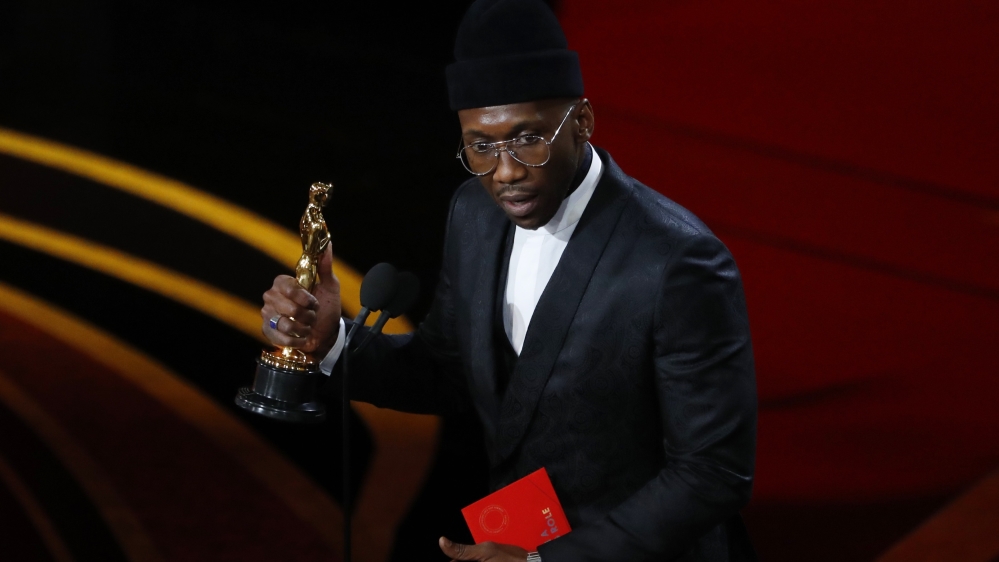Oscars: Green Book wins top award, Alfonso Cuaron best director
Green Book, the tale of a celebrated black pianist who befriends his white driver as they tour the segregated American South in the 1960s, has overcome controversy to win Oscars gold.
The critically acclaimed film on Sunday secured the coveted Best Picture Oscar to wrap up the Academy Awards – a bit of an upset over Mexican filmmaker Alfonso Cuaron’s Roma, which had been the heavy favourite.
The top prize was the third statuette of the night for Green Book, which earned a total of five nominations.
Mahershala Ali won the Best Supporting Actor Oscar for his portrayal of pianist Don Shirley, who strikes up an unlikely friendship with driver Tony “Lip” Vallelonga – Best Actor nominee Viggo Mortensen.
The film also won for Best Original Screenplay.
“The whole story is about love. It’s about loving each other, despite our differences, and finding out the truth about who we are – we’re the same people,” said director Peter Farrelly.
 |
| Mahershala Ali accepts the Best Supporting Actor award for his role in Green Book [Mike Blake/Reuters] |
Green Book beat seven other films for top honours: Roma, superhero flick Black Panther, Spike Lee’s BlacKkKlansman, Queen biopic Bohemian Rhapsody, offbeat royal romp The Favourite, musical romance A Star Is Born, and Dick Cheney biopic Vice.
Cuaron won the Best Director Oscar for Roma, which also won awards for Best Foreign Language Film and Best Cinematography.
In his acceptance speech, Cuaron paid tribute to the 70 million domestic workers around the world and to indigenous women in his acceptance speech.
“I want to thank the Academy for recognising a film centred around an indigenous woman,” he said.
“A character that has historically been relegated to the background of cinema.”
 |
| Alfonso Cuaron speaks on stage after accepting the Best Director award for Roma [Mike Blake/Reuters] |
 |
| Olivia Colman accepts the Best Actress award for her role in The Favourite [Mike Blake/Reuters] |
In an upset, Britain’s Olivia Colman won the Best Actress Oscar for The Favourite, beating presumed frontrunner Glenn Close, who starred in The Wife.
“Glenn Close – you have been my idol for so long, and this is not how I wanted it to be,” a delighted but shocked Colman told her fellow actress, sitting in the audience.
Rami Malek won for his role as late Queen frontman Freddie Mercury in 21st Century Fox musical Bohemian Rhapsody. The film won three other Academy Awards.
“I may not have been the obvious choice, but I guess it worked out,” said Malek, who had been favoured to win the award.
Regina King won her first Oscar for her supporting role as a mother fighting for justice in If Beale Street Could Talk.
BlacKkKlansman meanwhile won the Best Adapted Screenplay award, delivering Spike Lee his first competitive Oscar.
 |
| Rami Malek accepts the Best Actor award for his role in Bohemian Rhapsody [Mike Blake/Reuters] |
 |
| Regina King poses backstage with her Best Supporting Actress award for her role in If Beale Street Could Talk [Mike Segar/Reuters] |
 |
| Spike Lee (left) embraces Samuel L Jackson after winning the Best Adapted Screenplay award for BlacKkKlansman [Mike Blake/Reuters] |
‘White saviour movie’
Green Book – co-written by Vallelonga’s son, Nick – explores race relations and identity as Shirley embarks on the tour and is forced to rely on his initially racist, ill-mannered Italian-American driver.
The feel-good movie is named after The Negro Motorist Green Book, an annual guidebook that provided African Americans advice on safe places to eat and sleep while travelling during segregation.
It racked up a number of accolades in the run-up to the Oscars, including a best musical/comedy film award at the Golden Globes and the top prize from the Producers Guild of America.
But while the film has proven a crowd-pleaser, it has been embroiled in controversy since its premiere.
 |
| Peter Farrelly accepts the Best Picture award for Green Book [Mike Blake/Reuters] |
Shirley’s relatives, including his brother, have objected to the storyline, saying they were never consulted and have denounced the film as a “symphony of lies”.
Shirley’s niece, Carol Shirley Kimble, blasted the movie as a “depiction of a white man’s version of a black man’s life.”
The film also became part of a wider debate in the United States about race, with many describing it as yet another “white saviour movie” told through the lens of its white protagonist.
“The Green Book is a black story, and for a white man to steal that legacy and name for a film that has little or nothing to do with The Green Book is unacceptable,” Oscar-winning director Roger Ross Williams said in a Facebook post.
“We have always had our stories and our history stolen from us and told through the lens of whiteness and this film is Hollywood’s latest example.”
Vallelonga has defended his work, saying it was based on stories his father told him about the tour. He also says Shirley advised him before his death not to speak to anyone else about his project.
“We were aware of the certain tropes, like the white savior trope – the white guy saves the black guy — as well as the black savior trope – the black guy saves the white guy,” Farrelly told Newsweek in November.
“We were careful not to make this film either of those.”
Farrelly and Nick Vallelonga had both attracted negative headlines themselves – the director for an apparent dirty practical joke he used to pull on sets, and Vallelonga for an anti-Muslim tweet. Both later apologised.




